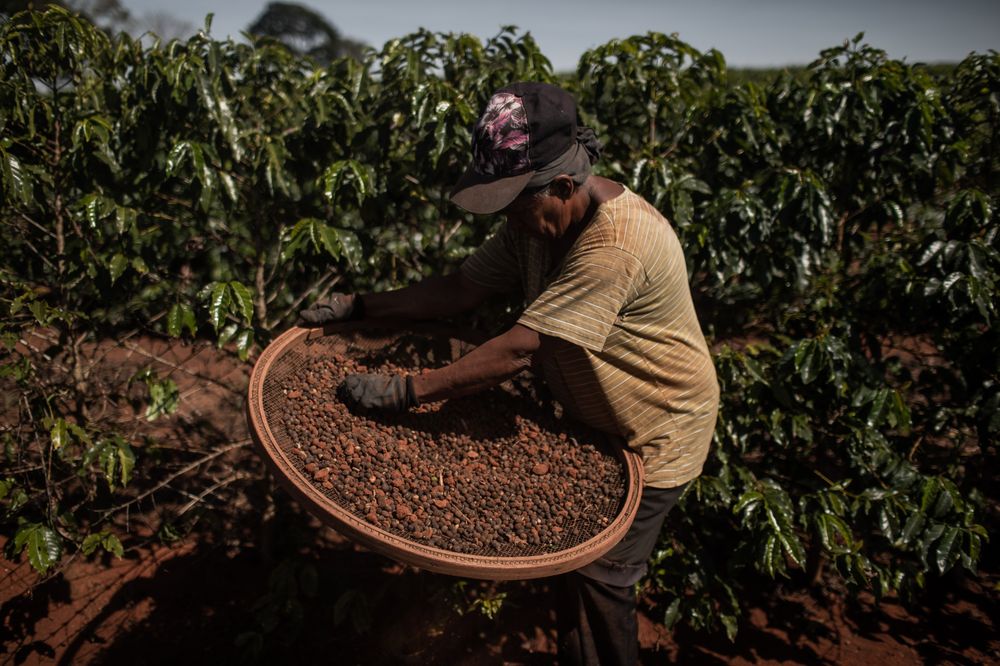Brazilian coffee production will be reduced due to drought in Brazilian coffee producing areas.
Professional coffee knowledge exchange more coffee bean information please follow the coffee workshop (Wechat official account cafe_style)
Brazil is now the world's largest exporter of coffee, sugar and orange juice.
Brazil's main agricultural exports are concentrated in the south-central part of the country, where land has recently cracked and rivers are low. The drought is so severe that farmers worry about the dry season in the coming months, and they worry that there will not be enough water to water their crops.

Maurizio Pinheiro, 59, who owns a 53-hectare (131acre) plantation, chose to artificially irrigate his Arabica coffee crop two months earlier than usual when the rainfall was less than half that of the past, so that there was not enough water to supply his home. In order to ensure that there was enough water to irrigate the crops in the botanical garden, he had to find another well.
"Irrigation reservoirs usually dry up in August, but now they are dry. I'm really worried that there will be no water available in the next few months. " Said Pinheiro, who lives in Pedregulho, AltaMogiana District, Sao Paulo.
Fears of famine continue to rise as agricultural prices rise to multi-year highs. Rising food prices and the spread of the COVID-19 epidemic have made the problem of hunger more and more serious. Recently, coffee and raw sugar futures on the New York ICE Futures Exchange hit more than four-year highs.
Without enough water to irrigate crops, Brazil's orange and coffee production is likely to decline in the second year. Orange production in Brazil is 31 per cent lower than in the previous quarter, the biggest drop in 33 years. Arabica coffee production, which is supplied to some international coffee chains, has also fallen sharply.

Rainfall in Sao Paulo and Minas was unusually low from January to April, with rainfall in the worst-hit areas less than half of what it used to be. Now is the critical period for the irrigation of coffee crops, and it is also the period when the soil stores water to withstand drought. Paul Markert, a meteorologist at a technology company in Maryland, said there were worse-than-normal droughts in some areas last year, especially in S ã o Paulo and Parana.
Although it is relatively dry in Brazil at this time of year, it is expected to last longer than usual, adding to concerns. Meteorologist Celso Olivera (Celso Oliveira) said that in the past, rainfall will return between October and November, not September.

About 30% of oranges and 15% of Arabica coffee crops in Brazil use irrigation systems.
Francisco Sergio de Assis (Francisco Sergio de Assis), a coffee grower in the city of Montcamelo in Serrado, Minas Gerais, who started irrigating farmland a month earlier, believes his reservoir has no water if it doesn't rain in September.
The situation is getting more and more serious for the orange plantation. A grower who owns a 45-hectare orange plantation in Sao Paulo says he has relied on irrigation for most of his time since January.
The water level of the reservoir continues to fall and is expected to bottom out before the dry season. This affects much of the state of Sao Paulo and endangers the next season's crop.
For more boutique coffee beans, please add private Qianjie coffee on Wechat. WeChat account: kaixinguoguo0925
Important Notice :
前街咖啡 FrontStreet Coffee has moved to new addredd:
FrontStreet Coffee Address: 315,Donghua East Road,GuangZhou
Tel:020 38364473
- Prev

Honey snow ice city issued an apology due to food safety problems. How many stores are there in honey snow ice city?
On May 14, a number of media reported that there were hidden food safety problems in some stores in Honeyue Ice City. Among them, the stores of Honey Snow Ice City Co., Ltd., Yongan Street in Zhengzhou, Daguanyuan in Jinan and Mahu Commercial Street in Wuhan, tamper with the date labels of Kaifeng ingredients, change the expiration date of ingredients at will or not record the expiration date of tracking cards, and illegally use overnight ice cream milk and tea.
- Next

I wanted to have a cup of coffee, but Starbucks collapsed. The reason why Starbucks APP collapsed.
Weibo is back on the hot search list. This time it's because the Starbucks APP crashed. According to the official Weibo of Starbucks, the reason for the collapse of Starbucks' APP is that Starbucks launched a campaign to buy 150 yuan and give away computer bags. On May 17, Starbucks said on its official blog that Starbucks Club members order from May 18 to May 24 (Starbucks App/ Wechat Starbucks)
Related
- Unexpected! Ruixing Telunsu lattes use a smoothie machine to foam milk?!
- % Arabia's first store in Henan opens into the village?! Netizen: Thought it was P's
- Does an authentic standard mocha coffee recipe use chocolate sauce or powder? Mocha Latte/Dirty Coffee/Salty Mocha Coffee Recipe Share!
- What is the difference between Vietnam egg coffee and Norway egg coffee? Hand-brewed single product coffee filter paper filter cloth filter flat solution!
- What is the difference between sun-cured and honey-treated coffee? What are the differences in the flavor characteristics of sun-honey coffee?
- How to make Italian latte! How much milk does a standard latte use/what should the ratio of coffee to milk be?
- How to make butter American/butter latte/butter Dirty coffee? Is hand-brewed coffee good with butter?
- Is Dirty the cold version of Australian White? What is the difference between dirty coffee/decent coffee and Australian white espresso?
- Relationship between brewing time and coffee extraction parameters How to make the brewing time fall to 2 minutes?
- Got entangled?! Lucky opens a new store, Mixue Ice City, and pursues it as a neighbor!

